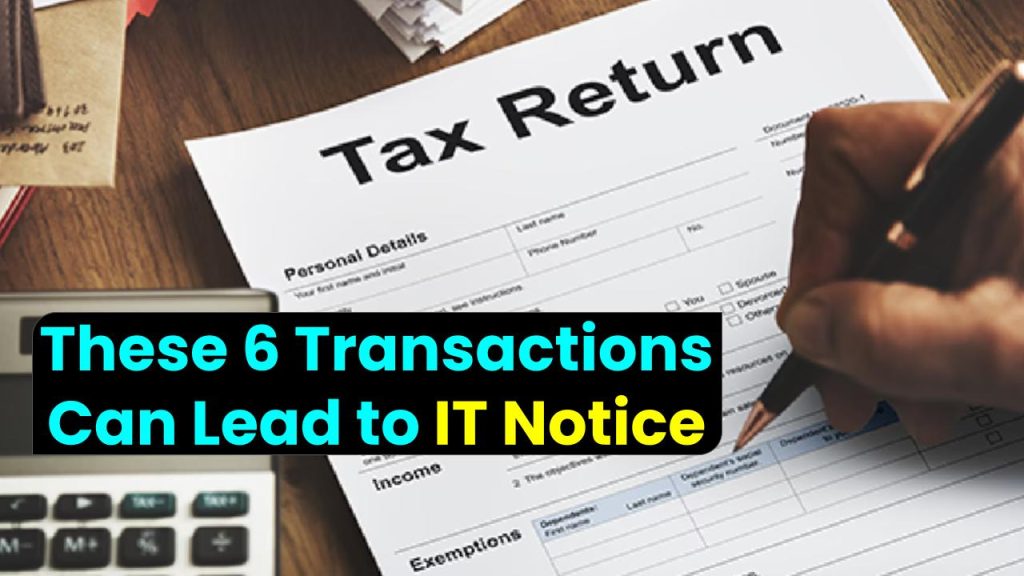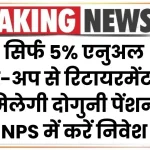
Are you aware that some common financial transactions can trigger an Income Tax Department (IT Notice)? Whether you’re a salaried professional, business owner, or investor, the Income Tax Department keeps a close eye on high-value transactions, and if you’re not careful, a notice might land in your inbox.
In this article, we break down the six key transactions that could attract tax scrutiny. We also offer practical tips, examples, and official references to help you stay compliant and stress-free. Even if you’re new to the world of taxes, don’t worry — we’ll explain everything in simple, actionable language that even a 10-year-old can understand.
IT Notice: Transactions Can Lead to Income Tax Department Notice
| Topic | Details |
|---|---|
| Concern | 6 financial transactions that can trigger an IT notice |
| Main Risk | Failing to report or explain high-value transactions |
| Examples | Cash deposits over ₹10 lakh, property deals over ₹30 lakh |
| Who Should Care | Salaried individuals, freelancers, business owners, investors |
| Reported Under | Annual Information Statement (AIS) and Statement of Financial Transactions (SFT) |
| What to Do | Maintain records, file accurate ITR, avoid large unaccounted cash deals |
In today’s digital age, your financial activities leave a trail — and the Income Tax Department is watching closely. Whether you’re investing, traveling, or simply saving, it’s vital to understand which actions might trigger an Income Tax notice.
By staying aware of the 6 transactions mentioned above, filing correct ITRs, and maintaining records, you can enjoy financial freedom without fear. Tax compliance isn’t just about rules — it’s about peace of mind.
What Triggers an IT Notice?
The Income Tax Department of India uses a system known as SFT (Statement of Financial Transactions) to track large transactions. Banks, mutual funds, property registrars, and other institutions are legally required to report certain transactions. If your financial behavior doesn’t match the income declared in your ITR (Income Tax Return), the system may flag your case for review.
see also: Cheque Bounce: There is No Money in the Bank Account and the Cheque is Deducted
Cash Deposits Over ₹10 Lakh in Savings Account
Rule: If you deposit ₹10 lakh or more in cash into your savings account in a financial year, it gets reported to the IT Department.
Example: Suppose you deposit ₹2 lakh every month for five months — this totals ₹10 lakh. If this is not supported by your declared income, the tax authorities may send you a IT Notice.
Expert Tip: Always deposit cash that is traceable to a legal source (salary, business income, etc.) and keep a record.
Reported under SFT Rule 114E, Section 285BA of the Income Tax Act.
Cash Deposits Over ₹50 Lakh in Current Account
Rule: If your current account (usually used for business) receives cash deposits exceeding ₹50 lakh in a financial year, this is a red flag.
Why It Matters: The Income Tax Department may check if your business income justifies such deposits. Discrepancies between your GST filings, profit declarations, and bank activity could prompt a deeper investigation.
Credit Card Payments Over ₹1 Lakh in Cash or ₹10 Lakh via Any Mode
Rule: If you pay ₹1 lakh or more in cash or ₹10 lakh+ through cheque/card/net banking toward your credit card bill in a year, this gets reported.
Example: If your credit card spends total ₹12 lakh in a year and you pay ₹10 lakh by online transfer, the tax department expects your income to support this lifestyle.
What You Should Do:
- Don’t use someone else’s credit card or pay on behalf of others.
- Keep monthly statements and payment proofs.
Property Purchase or Sale Worth ₹30 Lakh or More
Rule: Buying or selling immovable property worth ₹30 lakh or more is reported to the IT Department.
What to Know:
- The registrar’s office reports these deals.
- The department matches this with your ITR to see if your declared income could have funded the transaction.
Tip: If you took a home loan, your loan sanction letter and EMI details will help justify the purchase.
Relevant Section: SFT under Rule 114E of Income Tax Rules.
Investment of ₹10 Lakh or More in Mutual Funds, Shares, Bonds
Rule: If you invest ₹10 lakh or more in:
- Mutual Funds
- Shares or Debentures
- Bonds
This is flagged for reporting under the SFT system.
Why This Matters: Investing is good, but if your income doesn’t match the size of investments, you’ll need to show where the funds came from — savings, inheritance, or capital gains.
Tip for Professionals: Use your PAN in all investments to keep your income, tax, and portfolio aligned.
Foreign Exchange Transactions Over ₹10 Lakh
Rule: If you purchase foreign exchange (including prepaid forex cards or outward remittances) worth ₹10 lakh or more, it is reported.
Examples:
- Paying ₹12 lakh for your child’s overseas education
- Booking a luxury foreign holiday
Advice: Maintain:
- Copies of your remittance forms
- Purpose codes for LRS transactions
- Income proof for large payments abroad
How to Avoid Getting an IT Notice
You don’t have to panic. Getting a notice doesn’t always mean you’re in trouble. But being prepared is key. Here’s what you can do:
Keep Records of All High-Value Transactions
Always save:
- Bank statements
- ITR acknowledgment
- Property sale/purchase deeds
- Investment account statements
Match Income with Spending
Ensure that your spending and investing pattern reflects your declared income.
File Accurate and Timely ITR
Use Form 26AS and Annual Information Statement (AIS) to check reported transactions before filing.
Respond Promptly to Any Notice
If you do get a IT Notice:
- Read it carefully
- Understand the reason
- Respond within the due date
- Consult a tax expert if needed
see also: You Can Create a Fund of ₹1 Crore by Investing ₹3,000 in SIP
IT Notice: Income Tax Department Notice FAQs
1. What is an SFT in Income Tax?
SFT (Statement of Financial Transactions) is a report filed by institutions like banks, mutual fund houses, etc., listing high-value transactions.
2. Can I get an IT notice for depositing ₹5 lakh in cash?
You may not get a IT Notice immediately for a single ₹5 lakh deposit, but multiple such deposits adding up to ₹10 lakh or more can trigger reporting.
3. Do online transactions get monitored too?
Yes. Any payment method — UPI, net banking, cheque, NEFT — is traceable. It’s not just about cash.
4. What if my transaction is legal but still flagged?
If you’ve declared everything honestly, simply respond to the notice with proofs. No penalty is charged for being truthful.
5. Is income below taxable limit exempt from scrutiny?
Even if your income is below ₹2.5 lakh, large transactions that don’t match your profile may still raise questions.











